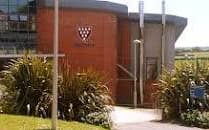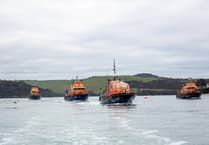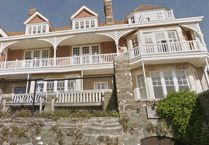ONE of the dive team responsible for the haul of gold coins found near Salcombe has died after a long illness.
Neville Oldham, 80, died on Tuesday, November 17, with his wife Jill saying he ‘fought bravely to the end’.
Neville was born in Cheshire in 1935, where he grew up on the family farm and later in the family pub before joining the Grenadier Guards at 18. He served as an Assault Pioneer Sergeant in the Suez, where he was introduced to the passion that would lead him to Buckingham Palace – scuba diving.
After his service with the Grenadier Guards, he helped found the East Cheshire branch of the British Sub-Aqua Club and remained a member ever since. He held posts in the branch as chairman, training officer and secretary. He was made an honorary club member in 1979.
While working with the East Cheshire BSAC, Neville also began his own building company specialising in dry-stone-walling and older buildings. Neville was continuing to build dry-stone-walls up until his retirement.
Neville met his wife Jill in 1985, through mutual friends at an East Cheshire BSAC party, and they married two years later. He was a much loved stepfather to Jill’s three children who she says ‘have always thought very highly of him’.
Neville took a break from the building business and he and Jill moved to Hope Cove to run a dive boat and to provide his services as a professional diver. This gave him his great knowledge of the shipwrecks of the South Devon coast.
Neville was an early member of the Nautical Archaeological Society and started an International Shipwreck Conference, now IMASS, which has been running for 33 years with him at the helm as chairman. In 2011 Neville became a Fellow of the Marine Archaeological Society.
Neville also lead the Bigbury Bay Archaeology team, who were invited to Buckingham Palace last year to receive the Duke of Edinburgh Gold Prize for the Bigbury Bay project for the British Sub-Aqua Jubilee Trust.
His Bigbury Bay investigation group teamed up with divers from Northampton to form the South West Maritime Archaeology Group and become an English Heritage licensee for both the Erme Estuary and Moorsands protected wreck sites.
The team’s work on the sites has revealed artefacts that have rewritten the known history of the maritime trading links that date back over 3,000 years.
Neville and his team once turned down £1.2million for the haul of gold coins they found in the Erme Estuary, which are now safely in the British Museum.
Neville was at Gara Rock Hotel last year for the unveiling of the plaque informing visitors of the wreck sites below. Dr Sarah Wollaston MP said as she unveiled the plaque: ‘The South West Maritime Archeological Group is preserving the history of our coasts for future generations. Thank you to them for keeping it safe for the future.’
Neville and his team have been featured on BBC films including ‘White Slaves Pirate Gold’, ‘Digging for Britain with Alice Roberts’ and ‘Ancient Britain with Neil Oliver’. Details of these, including links to the British Museum, can be seen on the website: www.swmag.org.
His love of diving and the underwater world lead him to write a book with friend Steve Clarkson, on their search for the wreck of the Armada Hospital ship the San Pedro El Mayor, which can be found on Amazon.
Over the last five years Neville has been running projects sponsored by the BSAC Jubilee Trust, some of his projects can be seen at: www.marinearchaeology.org.
Neville’s wife Jill will remember him as a ‘kind, generous and humourous man’ who was ‘much-loved by his wife and stepchildren’.
Friend Steve Clarkson said: ‘Neville has developed a wide network of friends across the diving, shipwreck and archaeological spectrum and will be sadly missed by all.’





Comments
This article has no comments yet. Be the first to leave a comment.